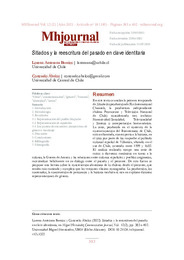Por favor, use este identificador para citar o enlazar este ítem:
https://hdl.handle.net/11000/26381Registro completo de metadatos
| Campo DC | Valor | Lengua/Idioma |
|---|---|---|
| dc.contributor.author | Antezana Barrios, Lorena | - |
| dc.contributor.author | Ábalos, Consuelo | - |
| dc.date.accessioned | 2022-03-28T09:20:21Z | - |
| dc.date.available | 2022-03-28T09:20:21Z | - |
| dc.date.created | 2021-07-31 | - |
| dc.identifier.citation | Vol. 12 (2021) | es_ES |
| dc.identifier.issn | 1989-8681 | - |
| dc.identifier.uri | http://hdl.handle.net/11000/26381 | - |
| dc.description.abstract | En este texto se analiza la primera temporada de Sitiados (coproducción de Fox International Channels, la productora independiente chilena Promocine y Televisión Nacional de Chile) considerando tres ámbitos: Narratividad/Serialidad, Televisualidad y Síntesis o interpretación hermenéutica. La serie, producida en el contexto de la conmemoración del Bicentenario de Chile, está ambientada, con respecto a la historia, en el sitio por parte de los mapuche al poblado colonial español de Villarrica, ubicado en el sur de Chile, ocurrido entre 1599 y 1602. El análisis realizado rompe una serie de mitos o discursos canónicos en torno a la colonia, la Guerra de Arauco y las relaciones entre colonos españoles y pueblos originarios, moviéndose hábilmente en su diálogo entre el pasado y el presente. De esta forma se propone una lectura sobre la construcción identitaria de lo chileno desde el presente, que resulta más matizada y compleja que las versiones clásicas consagradas. La producción, los contenidos, la construcción de personajes y la historia también es rica en explorar distintas representaciones de género | es_ES |
| dc.description.abstract | This text analyzes the first season of television series Sitiados (co-produced by Fox International Channels, the Chilean independent production company Promocine and Televisión Nacional de Chile) considering three areas: Narrativity / Seriality, Televisuality and Hermeneutical Interpretation. The series, produced in the context of the commemoration of Chile’s Bicentennial, is historically set on the besiege of Spanish colonial town of Villarrica, located in southern Chile. This event took place between 1599 and 1602 and was carried out by the mapuche people who wanted to force the conquerors out of their territories. The analysis proposed breaks a series of myths or canonical discourses around the colonial period, the Arauco War and the relations between Spanish settlers and native peoples, skillfully moving in its dialogue between the past and the present. Thus, a more nuanced and complex reading of how Chileans’ identity was constructed is proposed from the present, opposite to the more established classical versions. The production, content, character construction and story is also rich to enable exploring different representations of gender | es_ES |
| dc.format | application/pdf | es_ES |
| dc.format.extent | 20 | es_ES |
| dc.language.iso | spa | es_ES |
| dc.publisher | Universidad Miguel Hernández de Elche | es_ES |
| dc.rights | info:eu-repo/semantics/openAccess | es_ES |
| dc.rights.uri | http://creativecommons.org/licenses/by-nc-nd/4.0/ | * |
| dc.subject.other | CDU::3 - Ciencias sociales | es_ES |
| dc.title | Sitiados y la reescritura del pasado en clave identitaria | es_ES |
| dc.type | info:eu-repo/semantics/article | es_ES |
| dc.identifier.doi | 10.21134/mhjournal.v12i.1322 | - |
| dc.relation.publisherversion | https://doi.org/10.21134/mhjournal.v12i.1322 | - |

Ver/Abrir:
1322-Texto del artículo-6150-1-10-20210729.pdf
982,73 kB
Adobe PDF
Compartir:
 La licencia se describe como: Atribución-NonComercial-NoDerivada 4.0 Internacional.
La licencia se describe como: Atribución-NonComercial-NoDerivada 4.0 Internacional.
.png)